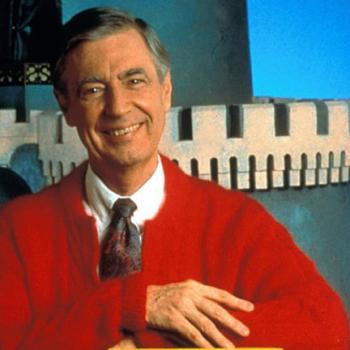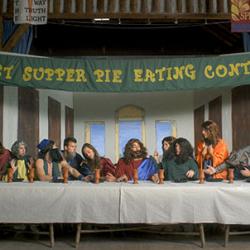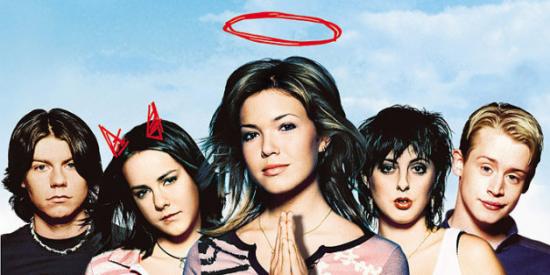
When I walked out of the theater after seeing “Saved!” 14 years ago, I was conflicted. I’d laughed quite a bit during Brian Dannelly’s satire of evangelical life, but it was often uncomfortable. Was Dannelly a Christian laughing at the extremes of his faith? Or were his attempts to find humor in American religion cynical and mean-spirited? As a rabidly Reformed twentysomething, could I be onboard with a movie that preached loving others without the disclaimer, “but, you know, sin is still sin”?
Re-visiting the movie recently, I laughed harder and without the conflict. The film’s skewering of evangelicals is maybe even more relevant in the MAGA era, but what I saw as cynicism back in my cage-stage days is replaced with a heart and conviction that’s more Christian than most faith-based films. Years later and more wary of evangelicalism, I saw it as an on-point skewering of how our culture distorts and dilutes faith. If evangelicals paid more attention to “Saved!” than to “God’s Not Dead,” the dialogue about faith and culture might be a lot better off than it is.
Mean Christian Girls
At Maryland’s American Eagle Christian School (a name that is uncomfortably plausible now), Mary (Jena Malone) is eager to begin her senior year. A devout believer who’s been “born again [her] whole life,” Mary is part of the popular “Christian Jewels,” along with popular Hilary Faye (Mandy Moore). Mary sings in the school’s worship ensemble, has a cool mom (Mary-Louise Parker), and a boyfriend who figure skates for Jesus.
But things are about to get shaken up at American Eagle. The school’s only Jewish student, Cassandra (Eva Amurri), smokes cigarettes and almost incites a riot when she starts undressing while pretending to speak in tongues during assembly. She’s also caught the eye of pious Hilary’s disabled and cynical brother Roland (Macaulay Culkin). The principal’s skateboarding-for-Jesus son (Patrick Fugit) has enrolled at the school. And Mary’s boyfriend confesses thinks he’s gay, a situation that ends up with him at a conversion camp and Mary carrying his child after what she believes was a God-ordained attempt to convince him of his heterosexuality ends badly.
This is not a film that gets a lot of play in youth groups.
But it’s a very funny movie. Dannelly’s script is witty, and the jokes are often savage. Its portrayal of teenage dynamics feels akin to something like “Mean Girls,” which was actually released only a month before “Saved!” Malone is a sympathetic and likable lead; she plays the naive good girl well, but also manifests the dawning confusion and complexity Mary begins to feel.
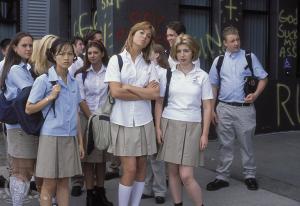
Moore, who is just now getting her due as a solid actress, is fantastic. Hilary Faye is the girl I knew in youth group who wanted everyone to know she was so much humbler than everyone else. Her piety is an excuse for getting everyone to love her, and faith is a competition — who can be the most gracious, the most loving, the most successful? She’s the girl who shows up at the every youth group activity, worship night and prayer rally and believes that her participation means God owes her some blessings. She sees herself as a saint for taking care of her disabled brother, and her concern for unbelievers is really just an excuse to elevate herself and take them down a notch. Her faith only works if it helps her be better than anyone else; it’s religion mixed with American exceptionalism. In 2004, maybe we thought it was being laid on a little bit thick; today, a sequel where a grown Hilary Faye tries to Make America Great Again would feel like a documentary.
Moore is the comedic and satirical centerpiece of the film, along with a game Heather Matarazzo and Elizabeth Thai as Hilary’s eager hangers-on. But Malone, Culkin and Ammuri are the film’s heart. They’re the doubters, screwups and outsiders, and that makes them underdogs at American Eagle. Parker and Martin Donovan (as the school’s principal) engage in a relationship that at first seems cliche but turns into something equally broken and sweet, even if their storyline is paper-thin. As I noted in my review of the similarly themed (but less abrasive) “Camp Manna,” it takes skill to do satire right, and “Saved!” benefits from a cast that ably handles this material.
Unfortunately, I don’t think a lot of people got the joke.
A mirror a bit too clearly
“Saved!” is razor-sharp, incisive satire of Christian culture, especially in its first hour. It gets laughs from the obsession evangelicals have with, well, being evangelical. As someone who’s grown up entrenched in the culture, I can attest that its characters’ behavior is only slightly exaggerated. I’ve known — and been — the people who see every nonbeliever as a conversion target, and every minute decision as a spiritual quest.
Director Brian Dannelly grew up in Christian schools, and knows the code language and weird quirks (“There’s only one reason a Christian girl would be at Planned Parenthood” … “She’s planting a pipe bomb?”). He’s been privy to the way being American and evangelical are too often one in the same, and how premarital sex and homosexuality are viewed as scandal-causing sins. He knows how piety can lead to self-righteousness and how the mix of nationalism and faith creates people who speak condescendingly to anyone different from them. I can understand why some Christians feel uncomfortable with this movie; the mirror image is too close to reality, and it’s not a pretty picture.
It doesn’t help that Christians don’t often understand satire and will often view any critique to be an attack on faith itself. Like “Life of Brian” or “The Simpsons,” however, it’s not an attack on belief but a skewering of our imperfect ways of living it out, conflating faith with power, piety with pride. If it’s uncomfortable, it should be; this film should have been a wake-up call to evangelical culture. Unfortunately, the jokes feel less exaggerated today, and what was shocking 14 years ago is now tweeted out daily.
But there’s a place for satire, even what I believe might a prophetic role for it. Satire exaggerates and calls attention to defects and absurdities, and humor can both lend the observations a bit of acid and disarm our defenses. The film’s barbs are pointed, told from the perspective of a director who’s endured rejection and judgment from the culture because of his sexual orientation. They sting — and they should; these aren’t the laughs of recognition that “Camp Manna” or Babylon Bee provide, but rather punchlines that should make people more aware of the impact their judgments and comments can have on others.
Jesus loves you
Were “Saved!” just angry one-liners, I don’t think I could recommend it. Criticism just for the sake of airing grievances risks being mean-spirited. But there’s a warmth at the center of the film and an understanding of brokenness and need for love that takes over in its back half.
Mary, as I said, finds herself in the family way which, of course, makes her an outcast from the Christian Jewels, bringing her closer to Roland and Cassandra as Hilary Faye grows more irrational and angry (Moore chucking a Bible at Malone and screaming “I’m filled with the love of the Lord” is an easy joke but it makes me laugh). As Mary tries to keep her pregnancy under wraps, they help her hide it. The three become friends, bonded by their doubt and outsider status. In the film’s final scene, a group of gay students who’d been sent to a conversion camp try to attend prom, only to be blocked by the principal. “I’m gay,” Mary’s ex says. “And I know Jesus still loves me.”
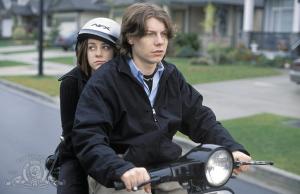
Fourteen years ago, this was the scene that bothered me. “But…but…,” I remember thinking, “But he wants you to change. You can’t be part of that church unless you repent.”
Older and wiser, the scene touched me. In that film’s finale, we see people who are divided by what they’re told is brokenness. Gay students, pregnant students, atheists, cynics and adulterers. All they want is a little grace, acceptance and love. If God is the one who judges, why do Christians feel like they have the responsibility to play gatekeeper? In the end, the ones who bond over their brokenness and ostracism are the ones with a happy ending. The ones like Hilary, who can’t conceive of giving grace and love to people they see as sinful and broken, rebel and despair. It’s a needed reminder in our society. We’re all bastards, but God loves us anyway, as Philip Yancey wrote.
I was recently listening to a podcast with a singer who’d been prominent in the Christian community. He’s since underwent a divorce and a separation from his faith. He was talking with the host about honesty in Christian community. He said that underlying Christian faith is the belief that we’re all broken, screwed-up people, something most believers would readily agree with. But the instant we start seeing that we are broken, screwed-up people, we want to keep it under wraps, hide it, and get the problematic brother or sister out.
I thought of that while re-visiting “Saved.” American Eagle Christian School and the evangelicalism of Hilary Faye pays lip service to grace. It wants to be pristine and shiny, treating every believer as trophies God puts on display. Their faith shuns brokenness and is always beautiful, happy and confident. The instant that facade is challenged, the threat has to be dealt with, the truth swept under the rug. We’re winners, they say; we triumph in everything.
Which is how we got into the mess we’re in today. It’s why churches are loathe to bring instances of sexual assault to authorities or deal with allegations; because to admit that there’s a problem would be to show our stains. It’s why we don’t like to deal with nuanced questions about sexuality, doubt or depression; because that’s not the victorious, trouble-free Christian life we like to sell. It’s why evangelical culture glosses over the sins of horrible men; because those men have promised to give them victory over their enemies and make life great and easy for them — promises the Bible can’t keep and doesn’t claim to.
If the film has a major flaw, it’s that it hints at issues and subplots it doesn’t have time to explore. The relationship between Mary’s mom and principal is confusing and never really handled well. Mary’s boyfriend’s time at the conversion house is never seen in any detail, but is a big part of the film’s climax. And there’s a whole political and cultural climate that didn’t exist in 2004 that is predominant now that, obviously, Dannelly couldn’t have predicted. I’d love to see a “Dear White People”-esque TV remake that dealt with this in more depth and maybe also brought in some commentary on our current situation.
But for now, “Saved! ” is a solid, pointed and jarring. It’s only grown more relevant since its release. I wish we had more movies this honest, and that Christians would watch them with an open mind.








